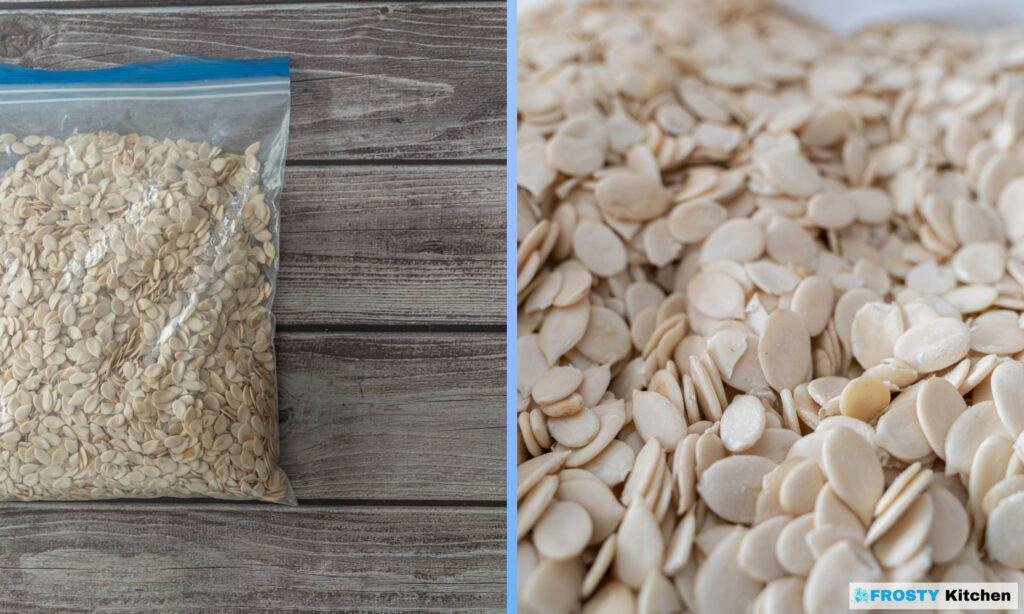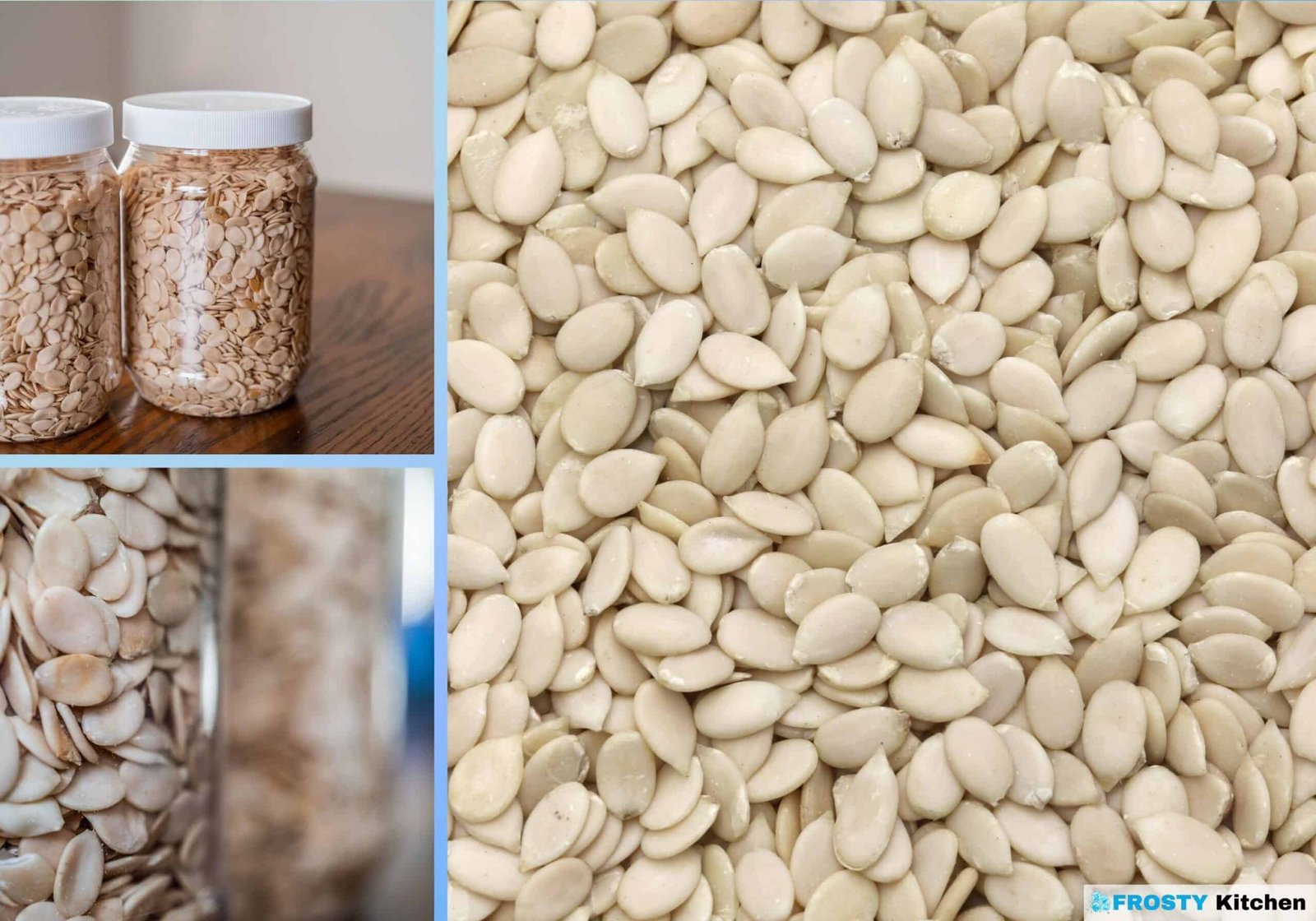The world of culinary delights is vast, and among its treasures, Egusi Seeds holds a unique place, especially in African cuisines. Known for their rich, nutty flavor, these seeds are a cornerstone of many traditional dishes. This guide aims to unveil the methods of storing Egusi Seeds in a way that preserves their essence, ensuring they remain fresh and nutritionally rich for your cooking adventures whenever inspiration knocks on your door.
What are Egusi Seeds?
Egusi Seeds come from various types of wild melon plants native to West Africa, known by the scientific name Citrullus lanatus. These seeds are particularly celebrated in Nigerian and other West African cuisines, where they are used to thicken and flavor soups and stews. With a resemblance to sunflower seeds but a unique flavor profile, Egusi Seeds have carved out their own identity in the culinary landscape.
They not only bring a delightful taste to dishes but also contribute nutritional value, being a good source of essential amino acids, vitamins, and other vital nutrients. Their versatility and nutritional richness make them a staple in many households across the region.
Origin and History
Egusi Seeds have deep roots in West African culinary traditions. Historically, they have been a significant part of the diet in this region, providing essential nutrients to communities. Over time, the use of Egusi Seeds has transcended regional boundaries, finding a place in various African diasporic cuisines.
Their application in traditional dishes like Egusi soup in Nigeria or Egusi stew in other parts of West Africa showcases their cultural importance and the unique flavors they bring to these traditional culinary delights.
Nutritional Value
Egusi Seeds are nutritional powerhouses, providing a host of essential nutrients. They are rich in protein, healthy fats, and vital minerals like magnesium, potassium, and calcium. Moreover, they are a good source of vitamins like Vitamin E and B vitamins.
- Heart Health: The presence of healthy fats in Egusi Seeds may contribute to heart health by helping manage cholesterol levels.
- Bone Health: The calcium content in Egusi Seeds supports bone strength and structure.
- Skin Health: Vitamin E in Egusi Seeds contributes to skin health by providing antioxidant protection.
The nutritional benefits of Egusi Seeds extend to overall wellness, making them a valuable addition to a balanced diet. Their nutrient-rich profile can play a role in managing and preventing various health conditions.

Importance of Proper Storage for Egusi Seeds
The proper storage of Egusi Seeds is vital to maintain their freshness, taste, and nutritional value. Without appropriate storage conditions, Egusi Seeds can easily lose their aromatic essence and nutritional potency.
General Lifespan and Preservation
Egusi Seeds generally have a shelf life of up to 6 months. However, with correct storage techniques, their lifespan can be considerably extended. Storing them in a cool, dark, and dry environment can significantly help in preserving their quality over time.
Factors Affecting the Lifespan of Egusi Seeds
Various factors can impact the lifespan and quality of Egusi Seeds. Understanding these factors can aid in preserving their freshness and nutritional value.
Temperature
Temperature control is crucial for maintaining the quality of Egusi Seeds. A cool and dry environment is ideal for storage.
Exposure to Light
Exposure to light can cause Egusi Seeds to degrade faster. Storing them in a dark place or in opaque, airtight containers is advisable.
Moisture Content
Moisture is detrimental to the freshness of Egusi Seeds. Keeping them in a dry environment is crucial to prevent mold growth and spoilage.
Packaging
Airtight packaging is essential to prevent exposure to air and moisture, which can degrade the quality of Egusi Seeds.
Air Quality
The oxygen content in the air can affect the rate at which Egusi Seeds go rancid. Vacuum sealing or using oxygen absorbers can help prolong their freshness.
Signs of Spoiled Egusi Seeds
Identifying spoilage in Egusi Seeds is crucial for ensuring safety and quality.
Odor
A rancid or off-putting smell is a clear indication of spoilage in Egusi Seeds.
Texture and Appearance
Changes in texture or appearance, like clumping or discoloration, are signs of spoilage or mold growth.
Preparation for Storage
Preparation is a key phase in ensuring the longevity and preservation of Egusi Seeds.
Cleaning
Ensuring that Egusi Seeds are clean and free from debris before storage is essential.
Preparing
Choosing high-quality, unspoiled Egusi Seeds for storage is critical. Discard any seeds that look discolored, moldy, or have an off smell.
Picking the Right Packaging/Container
The right packaging or container is vital for preserving the quality of Egusi Seeds. Airtight containers made of glass or BPA-free plastic are ideal choices.
Recommended Types of Containers for Storage
Glass jars with airtight lids, vacuum-sealed bags, or BPA-free plastic containers are excellent choices for storing Egusi Seeds. They help protect the seeds from air, light, and moisture, ensuring they remain fresh for a longer duration.
Step-by-Step Guide to Storing Egusi Seeds
Method 1: Dry Storage
- Step 1: Ensure the Egusi Seeds are clean and dry.
- Step 2: Transfer the seeds into an airtight container.
- Step 3: Store in a cool, dark, and dry place.
Method 2: Freezer Storage
- Step 1: Ensure the Egusi Seeds are clean and dry.
- Step 2: Transfer the seeds into a vacuum-sealed bag or airtight container.
- Step 3: Store in the freezer.
Frequently Asked Questions
Q1: Can Egusi Seeds go bad?
Yes, like other seeds, Egusi Seeds can go bad if not stored properly. They have a natural oil content that can turn rancid over time, especially when exposed to air, light, or high temperatures.
Q2: How can I extend the shelf life of Egusi Seeds?
To extend the shelf life of Egusi Seeds, keep them in a cool, dark, and dry place. Using airtight containers or vacuum-sealed bags can significantly prolong their freshness and nutritional potency.
Q3: Are there any special considerations for storing Egusi Seeds in humid climates?
In humid climates, it’s especially important to keep Egusi Seeds in airtight containers to prevent moisture exposure which can lead to spoilage. Storing in a cool and dry place, or even in the refrigerator or freezer, can also be beneficial.

